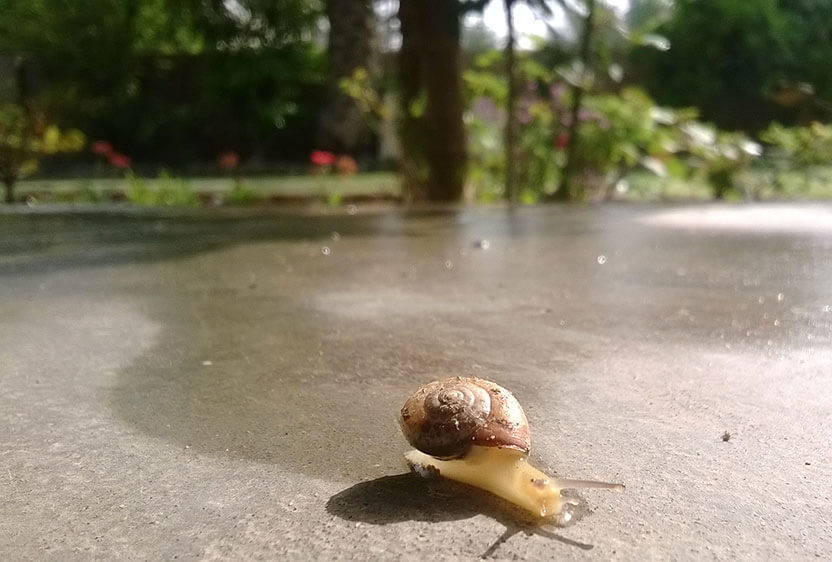The sound of the crunch is almost too awful to bear.
Whenever I’m walking my dog at night, the slugs and snails are out, weaving their way across the many footpaths of my neighborhood, leaving glistening trails of slime that iridesce in the sun the next day. There’s naturally a danger—particularly when the batteries in my headlamp are running low—that I’ll errantly tread on one of these creatures, and instantly feel a pang of regret and sadness as I hear the crunch of a snail’s shell.
I’ve found myself much more concerned these days with the welfare of other beings, including those with which we don’t associate the same sort of “sentience” we ourselves or our beloved pets possess. Other creatures with minimal anthropomorphic qualities—apes, dolphins, hedgehogs, turtles—also become the recipients of our affection, as we attach to them a sense of “cuteness” and relatability.
On a recent trip to visit family in D.C., my uncle found a spider in his garage, and despite my protestations, whacked it with his sandal. Since then I’ve gone over in my mind what better argument I could’ve made in the moment that might have spared that innocent arachnid’s life: It wasn’t hurting anyone, and in fact helps to control the nuisance bug population. Plus, it was in the garage, a place associated with dirty, outside things, and could very well have been swept up by a vehicle and brought there from the outside world.
I also find the tenet of Buddhist philosophy, which posits that any living creature, no matter how humble, was one’s mother in a former life, to be ethically appealing, even if I don’t subscribe to its literalness.
I wrote a piece about my conception of progressivism recently, where I stated:
“To me, at least, to be progressive is to feel that there is a wholesale transformation needed within our society, a shift that expands our sphere of concern from a narrow and tribal one to a more global one that treats all people, and perhaps even all sentient beings, as worthy of care and concern.”
Within the narrative of the “arc of the moral universe,” I discern a thread running through involving our sphere of concern. By necessity, early humans’ sphere was narrow and tribal, serving to ensure that the common gene pool of a social group survived to propagate further.
As we mastered our surroundings to the point where technology could provide us with the safety and survival not guaranteed to our forebears, our minds developed a fuller morality that took into account not just evolutionary advantage, but also the ideas of care and harm, joy and suffering. And those principles were applied to a wider range of outside groups—not just the clan members who would help us to further our own genetic legacy. Ultimately these codes have stretched, in principle, to include all human beings.
Human history is fairly straightforward in terms of the expansive moral changes we’ve wrought. It was not so long ago, in the span of our existence, that many, if not most, human societies thought it was okay to treat people outside our “in-group” as literal chattel property, believing that a slave mother had no more right to her child than a dog had to her litter of puppies.
But in the present day, as a species we’ve come to the global agreement that slavery is morally indefensible, and have continued to expand the full rights of personhood to every marginalized human group. While it’s shocking to recall that less than 100 years ago, more than half the adult population of the United States was still not guaranteed the right to vote on account of their gender (and Mississippi only finally ratified the 19th amendment in 1984, by the way), the history of our country and of many others is a march of expanding rights for a growing number of groups.
Progressives feel deep attachment to and responsibility for this trend of progressively expanding equality, although this responsibility is certainly a notion that conservatives dispute. But the expansion of marriage equality to same-sex couples was a change that, after being shepherded through by progressive leaders, was incorporated into the moral understanding of our culture fairly rapidly, with support jumping from 37% in 2009 to 62% in 2017. And progressives see this as a vindication of their strategy on the issue, which involved a push to make the change expeditiously and proactively, rather than waiting for the mood of the public to adjust before taking action.
The current frontier of human rights, in the minds of many blues, is the fight for equal protection based on sexual preference and gender identity, and I have a lot of confidence that we’ll fully realize these goals—at least legislatively—in the not-too-distant future.
But it also seems to me that we have work to do to expand our sphere of empathy beyond our fellow humans. Progressives have led the way in this regard, as well.
Many have long considered the idea that animals have just as many inherent rights as humans, encapsulated by that PETA’s insistence that “Animals are not ours to experiment on, eat, wear, use for entertainment, or abuse in any other way,” to be a bit of a fringe notion pushed by animal-rights groups outside the mainstream. But our growing awareness of the evils of factory farming, and concerns over disrupting the habitats of the animals around us, point in a very progressive direction, and it seems logical that this emphasis will continue to grow among human societies.
In many ways this is actually a return to earlier form. The Hebrew bible certainly helped to spread the idea that man holds dominion over the rest of the animal kingdom. Prior to this change, humans saw themselves as equal players in the grand game of life, fighting the same struggle to survive as all other creatures.
Once we gained a conception of ourselves as being to some extent divine, children of a god who created us in his or her own image, this new self-conception seemed to grant us not only the responsibility to care for the creatures of the earth, but also the inherent privilege of using the world, and all its other inhabitants, as resources for our own advancement. The most obvious and oft-cited example of contrast, in my mind, is the respect and gratitude that indigenous Americans extend to the animals that share the land, especially when they give their lives to benefit us.
I think this is an attitude that humanity must reclaim. Not so long ago, I didn’t really give a lot of thought to this idea, and I understand those who hesitate to embrace it fully, because I’m still among them. I’m certainly not a vegan, nor even remotely a vegetarian, although in recent years I’ve started to eat more vegetarian meals. And I’ve started finding out about what really matters when buying eggs—whether they’re cage-free, free-range, or organic.
This type of stuff is my limit for now, but I’ll probably move further in the direction of culinary awareness over time, especially as better labeling and more choices make it easier to do so. I don’t know if I’ll ever swear off a delicious Habit burger for good—but there would certainly be good reasons to do so.
I continue to work on my sense of empathy, and just like the vast majority of humans—perhaps even all of us—I have a long way to go. We may think the Dalai Lama has it pretty much figured out in the empathy department, but since our window keeps moving we really have no idea. He may be a selfish narcissist compared to the enlightened generations that follow him and us in the future.
What truly makes us transcendent as humans is not a kind of inherent superiority above our fellow creatures, but our capacity to transcend our pure self-interest—personal, genetic, or social—through mastery of our own minds and habits, and to expand our circle of empathy to the truly lowliest among us, whether or not they have evolved the cuteness of a baby or puppy.
Photo: WikiMedia Commons





1 thought on “Animals and Our Widening Sphere of Empathy”
I fully embrace this concept I am not vegan,. However I practice mindful eating and I admit I am far from being enlightened as the Dalai Lama. However I do have a butterfly garden with hosts plants for monarchs, swallow tails, Florida Queen, yellow, orange and white sulphur as well as moths, bees, dragon flies, and beetles I also get other pollinators like honeybees and birds such as parrots, cardinals, woodpeckers, sparrows, humming birds, the occasional crows, ibises and hawks My yard has become a “rain forest” and it is Certified Wild Life Habitat and I am so proud of it ! I do get snails, ants lizards, and other insects native to South Florida. And my garden is a host to a black snake that keeps the beach rats away from my home. Squirrels make nests in my palm trees. Florida frogs do hang around. I rarely spray my yard with pesticides and only and when there is lack of balance that either harms humans or that nature cannot fix on its own.
I personally don’t like iguanas, which are invasive to Florida and are destroying the local ecological system because they don’t have local
predators . They also spread salmonella through their poop. But I don’t kill them. I keep praying for a freeze during the winter so it will reduce their proliferation. I keep praying for bats so they can eat the mosquitos and termites., Bats are dying in large numbers in the U.S. In Florida with urban sprawling we are destroying their habitats. So I am educating myself on how to live among these earth creatures that are part of our eco-system.
Loving kindness and gratitude to Mother Nature and our planet are crucial to our survival.